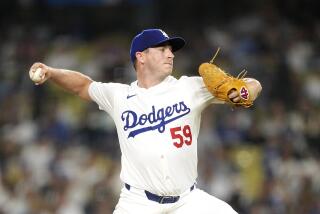Phillips Held Loaded Pipe When Arrested, Police Say
- Share via
ANAHEIM — Tipped off by an informant, Anaheim police say, they found Angel leadoff hitter Tony Phillips early Sunday in a motel room “with a loaded pipe in one hand and a lighter in the other” when they arrested him on felony charges of possession of cocaine.
Phillips allegedly bought $30 worth of crack cocaine in Room 52 of the Ivanhoe Motel on Katella Avenue as the deal was monitored by an undercover officer in the room and surveillance equipment. The informant, who sold Phillips three rocks of cocaine, alleged that she had sold drugs to Phillips in the past, said Anaheim Police Lt. Dave Severson.
Phillips, who was released after his arrest Sunday, has been a key player for the Angels, who are tied for the lead in the American League Western Division, since he joined the team in May after being traded from the Chicago White Sox.
Angel officials said they expect Phillips to be with the team, and possibly in the starting lineup, in Chicago today. But representatives of the baseball players’ union are recommending that he come to New York as soon as possible to be examined by doctors representing major league baseball and the union, according to baseball sources.
“Tony is scheduled to rejoin the team in Chicago,” Angel spokesman Bill Robertson said. “What we need to do is let the legal process run its course, and we will reserve judgment until all the facts are compiled and reviewed.”
Nevertheless, Phillips’ case presents the Angels’ owners, the Walt Disney Co., with their first decision over how to handle the drug-related arrest of a high-profile player.
Phillips could not be reached for comment. Manager Terry Collins said Monday after the team arrived in Chicago: “The only thing Tony told me is he thought he got set up. As much as I disliked it, I had to accept that and we have to let the law run its course. He says he’s innocent and he is until the system proves him guilty. So we have nothing to go on.”
Major league baseball players who voluntarily acknowledge drug use or are charged with a first drug-related offense can fight the charge in the legal system or seek help. Players who acknowledge substance-abuse problems usually are listed as disabled and enrolled in treatment programs.
But the Angels, union and baseball officials were unsure which course Phillips would take.
“Phillips has been charged with a crime,” said Lou Melendez, associate counsel of the owners/players relations committee. “Until that’s resolved, baseball will monitor the situation.”
Phillips could go to New York later in the week. The Angels end their seven-game road trip in Baltimore with games Friday, Saturday and Sunday.
The Orange County district attorney’s office could receive Phillips’ case by today, but it will more than likely be later in the week, according to police.
“We felt there was no real hurry since he is not in custody at this time,” Lt. Severson said.
The woman who police say sold the cocaine to Phillips is a confidential informant who had agreed to work with undercover officers as part of a crackdown on street-level drug dealing, Severson said. Phillips’ arrival and alleged request to buy drugs from the informant was simply a case of being in the wrong place at the wrong time.
“We didn’t go out of our way to arrest him,” Severson said. “He wasn’t our goal.”
Earlier that night, the same informant had bought three $10 rocks of smokable cocaine from a 40-year-old Santa Ana parolee, who was then arrested on a drug sales charge by undercover officers, Severson said.
Those same three chunks of the powerful drug were then sold to Phillips by the informant in her motel room as a plainclothes officer looked on, posing as the informant’s friend. Other Anaheim police officers entered the room and arrested Phillips, Severson said.
Phillips’ arrival at the motel room was no shock to detectives. The informant told police last week that she had sold drugs to Phillips in the past, Severson said. “The informant was a broker, that’s the best word for it,” he said.
The informant was working with the Anaheim Police Department’s seven-member street narcotics unit, which made 40 arrests in July and averages 30 a month, Severson said. Use of informants is a common tactic, but Severson declined to reveal much about the woman involved in this case, in an effort to shield her from the widening publicity surrounding Phillips’ arrest.
The team of investigators typically focuses its efforts on arresting dealers, not buyers, and they did not go to any extra lengths to arrest the high-profile suspect, Severson said.
But, Severson said, the detectives were also not going to ignore Phillips when he arrived to buy drugs.
“We’re sort of painted into a corner,” Severson said. “If we arrest him, people say we went after him. But if an informant tells us [Phillips] comes to purchase and smoke dope and we don’t do anything, then we’re guilty of not arresting him.” During that night’s surveillance, no other drug purchases were made, Severson said.
Angel players refused to comment on Phillips’ situation. But members of the Chicago White Sox, whom Phillips played with until he was traded in May, were stunned by the news.
“He’s a good man, a good family man, a good teammate to have,” shortstop Ozzie Guillen said. “I was shocked. I’m still not sure I believe it. I didn’t suspect anything and I didn’t think the guys did.”
Times staff writer Mike DiGiovanna contributed to this report.
* ROSS NEWHAN: Baseball columnist says Angel manager is too optimistic. C1
* ON THE DECLINE: Drug incidents in major league baseball down since 1980s. C1
More to Read
Go beyond the scoreboard
Get the latest on L.A.'s teams in the daily Sports Report newsletter.
You may occasionally receive promotional content from the Los Angeles Times.







